I took a look at the history of taxes in the USA. A few interesting (to me) factoids. The data comes from the Tax Policy Center (Link); the graphs are mine.
I’ve never been convinced that comparisons of the Depression, to today’s economic conditions, are valid. It was a different economy back then, with a much smaller government. Consider the following that plots taxation as a percent of GDP during the 1930s and 2008-12.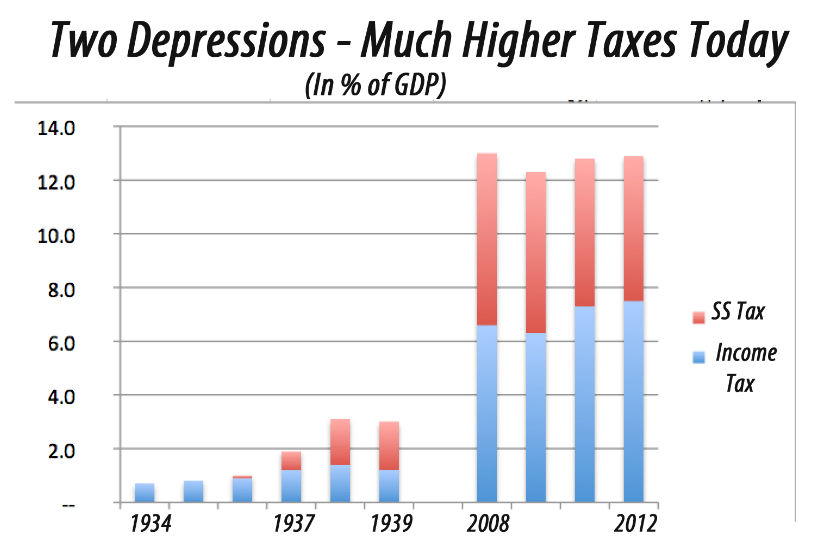
It took a world war to end the Depression, and that period was marked with very low taxes. People argue that taxes are too low today, maybe, but they are already 6Xs what they were the last time the SHTF.
I think the “modern economy” started around 1950. By then, the distortions from the Depression and WWII were unwinding. In addition, Social Security taxation became a meaningful percent of total individual taxation. The following charts look at the components of taxation from 1950 – 2012; the information is presented by President, the tax rates are the average for the respective tenure: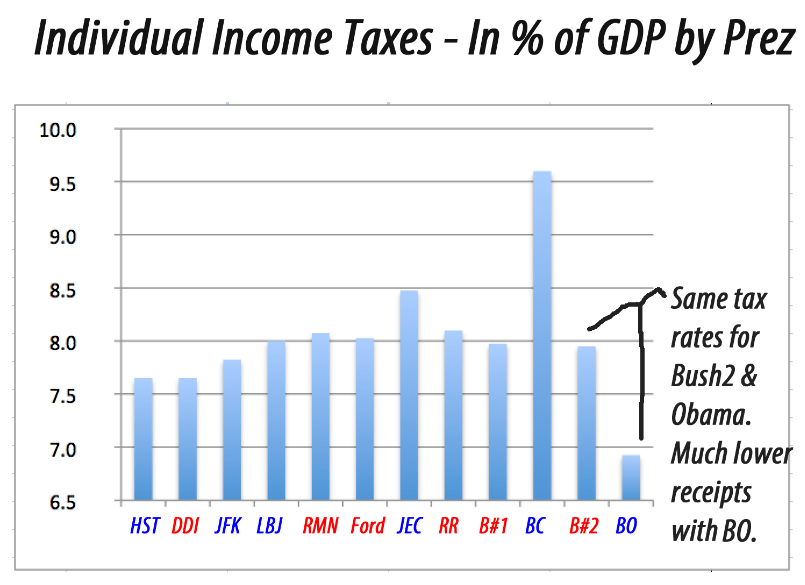
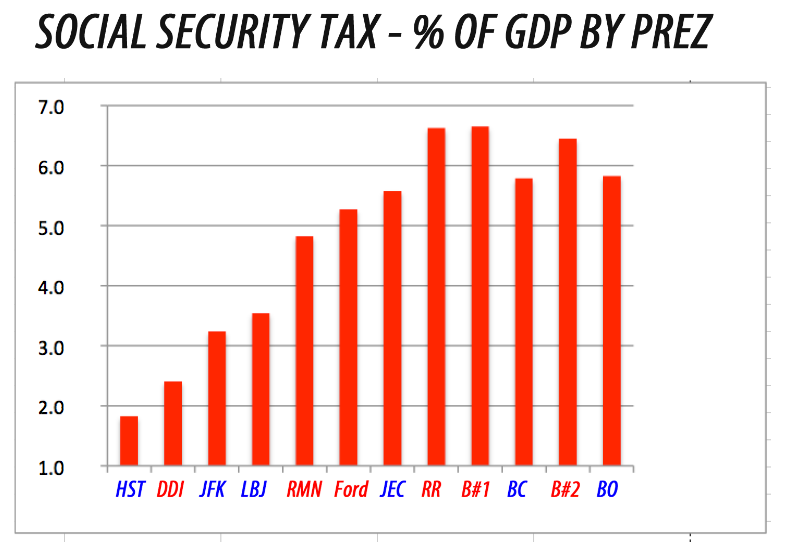
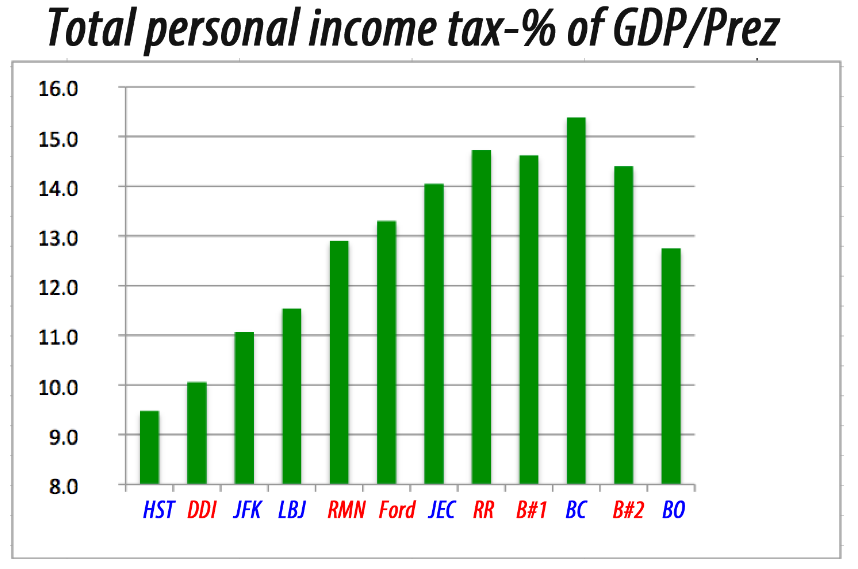
Some observations looking at this:
- I’ve read the arguments that tax rates in the 50’s were very high and the economy did just fine. Not true at all.
- The Clinton years are also pointed to as a period where income tax rates were high, and the economy did very well. This is appears to be correct. Marginal tax rates were higher; this contributed to the increase in total tax revenues. In addition, the capital gains that were generated in the late stages of the DotCom boom supported revenues. The bump in income taxes in 2000 was attributable to a hot stock market.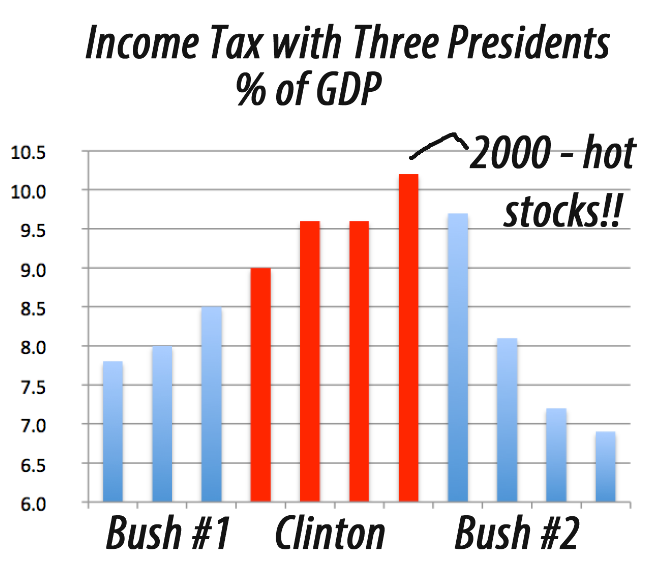
- The Obama years are marked with low tax receipts as a percent of GDP. The reasons for the drop include: (1) The recession and the drop in payrolls. (2) Losses from investments (houses and stocks) (3) The 2% reduction in Payroll taxes.
Corporate tax rates are at historically low levels today. The persistent argument from corporate America is that tax rates are a too high, and must be lowered if America is to compete in the global economy. There is some truth to this argument. The statutory corporate rate is 35%, but very few companies pay this rate.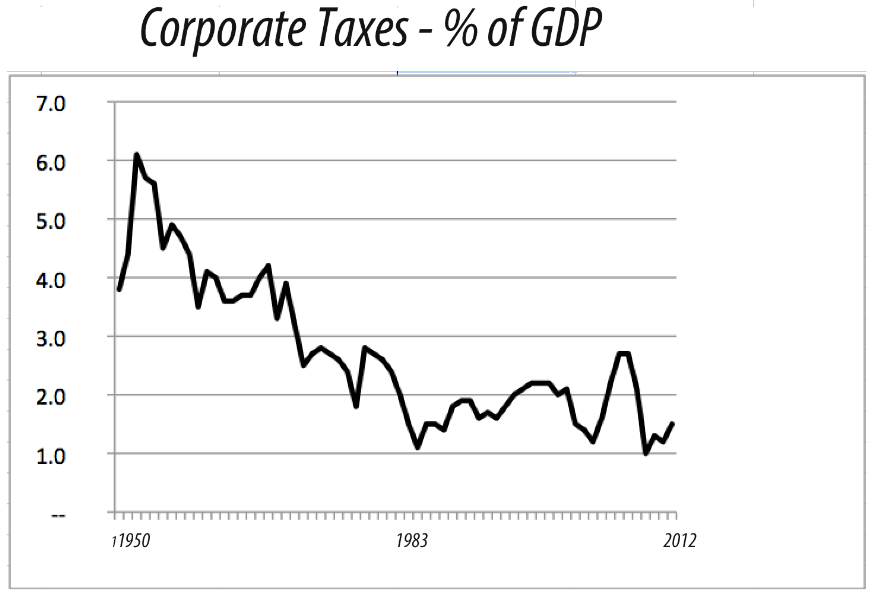
Federal excise taxes, as a percent of the economy, are at historical low levels today. This is, primarily, the gas tax.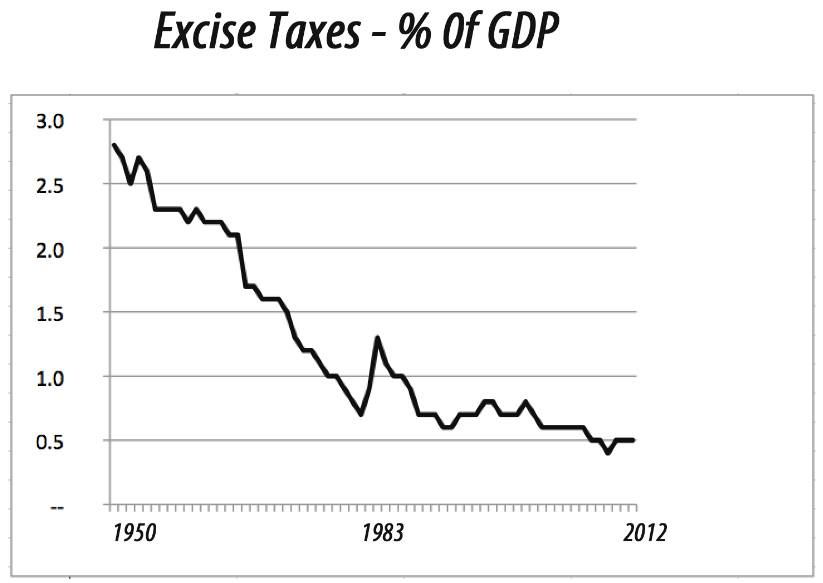
I don’t “like” any taxes, but some tax revenue is necessary. I particularly hate all income taxes. I favor taxes on consumption, not wages. If the excise taxes the government collects were doubled to equal 1% of GDP (still historically low), it would generate $1T+ over the next ten-years. Much more than either of the Bush tax cuts that are now up for discussion.
After looking at these charts I conclude:
- Social Security taxes impose a very heavy burden on the economy.
- Income tax revenues are low today because of the economy, not the marginal tax rates. Consider the fall off during the past four years versus the Bush era. Marginal tax rates were the same, but tax revenue, as a percent of the economy, fell. It’s the economy, not the tax rates that are the problem. D.C. is focused on the wrong issue.
- It’s well past time that a redo of corporate taxation is made. The system is busted. The end result should be a much lower marginal tax rate to insure competitiveness, but also a minimum tax rate that also insures some fairness, and higher net tax receipts.
- Excise taxes have to go up. Sorry.
- English (UK)
- English (India)
- English (Canada)
- English (Australia)
- English (South Africa)
- English (Philippines)
- English (Nigeria)
- Deutsch
- Español (España)
- Español (México)
- Français
- Italiano
- Nederlands
- Português (Portugal)
- Polski
- Português (Brasil)
- Русский
- Türkçe
- العربية
- Ελληνικά
- Svenska
- Suomi
- עברית
- 日本語
- 한국어
- 简体中文
- 繁體中文
- Bahasa Indonesia
- Bahasa Melayu
- ไทย
- Tiếng Việt
- हिंदी
Tax Facts : November 20, 2012
Published 11/21/2012, 01:23 AM
Updated 07/09/2023, 06:31 AM
Tax Facts : November 20, 2012
Latest comments
Loading next article…
Install Our App
Risk Disclosure: Trading in financial instruments and/or cryptocurrencies involves high risks including the risk of losing some, or all, of your investment amount, and may not be suitable for all investors. Prices of cryptocurrencies are extremely volatile and may be affected by external factors such as financial, regulatory or political events. Trading on margin increases the financial risks.
Before deciding to trade in financial instrument or cryptocurrencies you should be fully informed of the risks and costs associated with trading the financial markets, carefully consider your investment objectives, level of experience, and risk appetite, and seek professional advice where needed.
Fusion Media would like to remind you that the data contained in this website is not necessarily real-time nor accurate. The data and prices on the website are not necessarily provided by any market or exchange, but may be provided by market makers, and so prices may not be accurate and may differ from the actual price at any given market, meaning prices are indicative and not appropriate for trading purposes. Fusion Media and any provider of the data contained in this website will not accept liability for any loss or damage as a result of your trading, or your reliance on the information contained within this website.
It is prohibited to use, store, reproduce, display, modify, transmit or distribute the data contained in this website without the explicit prior written permission of Fusion Media and/or the data provider. All intellectual property rights are reserved by the providers and/or the exchange providing the data contained in this website.
Fusion Media may be compensated by the advertisers that appear on the website, based on your interaction with the advertisements or advertisers.
Before deciding to trade in financial instrument or cryptocurrencies you should be fully informed of the risks and costs associated with trading the financial markets, carefully consider your investment objectives, level of experience, and risk appetite, and seek professional advice where needed.
Fusion Media would like to remind you that the data contained in this website is not necessarily real-time nor accurate. The data and prices on the website are not necessarily provided by any market or exchange, but may be provided by market makers, and so prices may not be accurate and may differ from the actual price at any given market, meaning prices are indicative and not appropriate for trading purposes. Fusion Media and any provider of the data contained in this website will not accept liability for any loss or damage as a result of your trading, or your reliance on the information contained within this website.
It is prohibited to use, store, reproduce, display, modify, transmit or distribute the data contained in this website without the explicit prior written permission of Fusion Media and/or the data provider. All intellectual property rights are reserved by the providers and/or the exchange providing the data contained in this website.
Fusion Media may be compensated by the advertisers that appear on the website, based on your interaction with the advertisements or advertisers.
© 2007-2025 - Fusion Media Limited. All Rights Reserved.